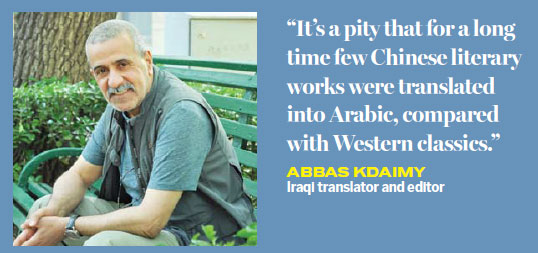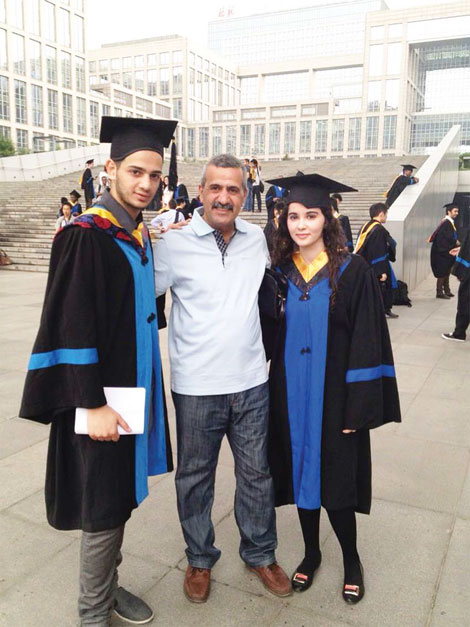Home away from home

Abbas Kdaimy has spent nearly two decades explaining Chinese society and culture to the Arab world
When Abbas Kdaimy made his first trip to China, his knowledge of the country was limited to what he'd read in school textbooks. Today, 18 years later, the Iraqi translator and editor says China and the Arab world have developed strong cultural links.
He moved to Beijing from Baghdad as a news editor for the Xinhua News Agency after the Gulf War of the 1990s and the ensuing United Nations sanctions that took a heavy toll on Iraq's economy.
| Abbas Kdaimy attends the graduation ceremony of his children at a Beijing university. Photos Provided to China Daily |

"I wasn't sure how Chinese people would receive me," recalls the 54-year-old, who is deputy editor-in-chief of the Arabic department at Foreign Languages Press.
Kdaimy arrived in Beijing alone in the summer of 1998 and says he was struck by the booming economy that stood in contrast to his country. His wife and three children soon followed.
In the early days, the family had to overcome challenges like finding an Arabic-language school for the children, and finding halal food.
"We all feel the hospitality and understanding of the Chinese people," Kdaimy says, adding that the food problem was solved after they found restaurants in the city catering to Muslims.
Despite living away, Kdaimy says his heart is with the Iraqi people and that he always looks out for news about his homeland.
He recalls one of his last difficult moments came on March 19, 2003, when the United States decided to invade Iraq. "I was crying in my heart," he says, adding that his Chinese colleagues helped him with emotional support.
Kdaimy has won the respect of his colleagues in China with his talent and hard work. The organizing committee of the 2008 Beijing Olympics invited him to write articles on China for Arab tourists and athletes. At the time, he says, he also witnessed the city's rapid development, an experience he calls "unforgettable".
He went to enjoy the Games and shared his knowledge of China with people from other countries at events when he had the time.
The next year, he joined Foreign Languages Press as a translator and editor and has been amazed by Chinese literature ever since.
"It's a pity that for a long time few Chinese literary works were translated into Arabic, compared with Western classics. I'm very excited to share this treasure and build a bridge between Chinese literature and Arab readers."
In past years, he has participated in translation projects of Chinese classics such as Romance of the Three Kingdoms from English to Arabic. Impressed by author Luo Guanzhong's narrative style and the portrayal of the novel's characters, he fell in love with the story, says he.
"There were hundreds of characters in the novel, but no one is like the other," he says. "I was deeply involved and could even feel the dust of the battlegrounds."
It took him and his colleagues three years to complete the Three Kingdoms project, with the Arabic edition to be published this year. He worked closely with Chinese scholars and also read extensively to learn about the history and ensure accuracy in translation.
During the process, Kdaimy says he often went back to the finished pages when he came up with better phrases. "I'd even wake up to note down my ideas, and put the note under my pillow to make sure I remembered to change my translation the next morning," he says.
He has also worked on many other translation projects aimed at introducing Chinese society to the Arab world. Although not all have been as intriguing as the classic literary works, he says he gets to learn about different social topics and events and has gained a deeper understanding of China.
Kdaimy, who compares translation with cooking, says, "It's a challenge to strike a balance between different ingredients and to find the right combination for the readers."
Language, cultural backgrounds and the readers' psychology are all important factors to be considered while undertaking such work, he says, adding that mutual understanding between Chinese and Iraqis, especially of their respective societies, is still limited.
In 2006, Kdaimy invited friends in China and Iraq to help rejuvenate the China-Iraq Friendship Association. The group, which is based in Beijing, had been inactive for years due to social chaos in Iraq. It has since made efforts to boost mutual understanding and has organized exchange activities between the countries.
For his contribution to cultural exchanges, in 2014, Kdaimy was given the Friendship Award, the highest honor presented by the Chinese government to foreigners who have made a significant contribution to the nation's social and economic development.
He says his love for China is getting stronger with time. "I have seen both my children and the city growing up. All my family love Beijing and want to stay here."
His children (the eldest was 8 when the family arrived in China) speak and write Chinese fluently. His two daughters and son are studying at universities in Beijing.
"My biggest dream is that all my children find good jobs, fit into Chinese society and enjoy stable, happy lives," he says.
liuxiangrui@chinadaily.com.cn
(China Daily European Weekly 07/02/2016 page18)
Today's Top News
- Takaichi must stop rubbing salt in wounds, retract Taiwan remarks
- Millions vie for civil service jobs
- Chinese landmark trade corridor handles over 5m TEUs
- China holds first national civil service exam since raising eligibility age cap
- Xi's article on CPC self-reform to be published
- Xi stresses improving long-term mechanisms for cyberspace governance































